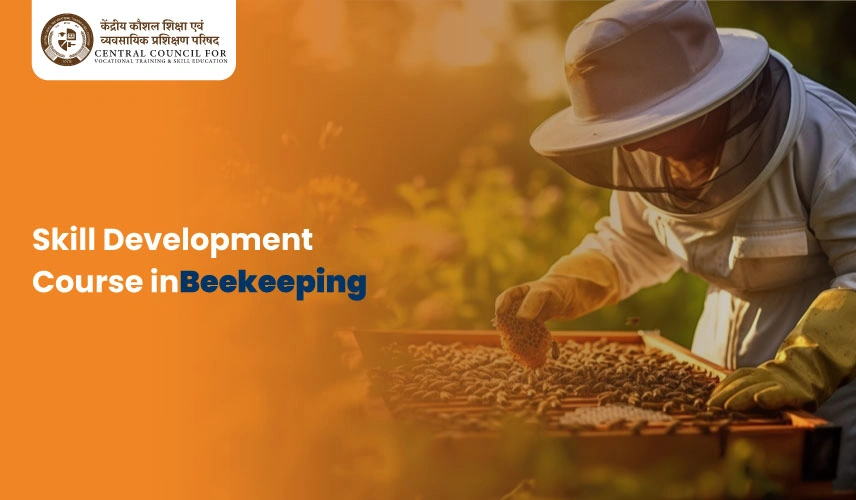- +91 8595350621
- info@ccvte.org
- C4/97B, Keshav Puram, Delhi-110035
Horticulture

Skill Development Program in Horticulture
Horticulture is the branch of agriculture that deals with the art, science, technology, and business of growing plants. This includes the cultivation of fruits, vegetables, nuts, seeds, herbs, sprouts, mushrooms, algae, flowers, seaweeds, and non-food crops such as grass and ornamental trees and plants. It also encompasses plant conservation, landscape restoration, soil management, landscape and garden design, construction, maintenance, and arboriculture. Horticulture is a diverse field that integrates various sciences, including botany, agronomy, environmental science, and biotechnology. It plays a crucial role in food production, enhancing food security, improving nutrition, and contributing to environmental sustainability. By developing and utilizing advanced cultivation techniques, horticulturists work to optimize plant growth, yields, quality, nutritional value, and resistance to insects, diseases, and environmental stresses. Horticulture also involves practices such as greenhouse management, turf management, viticulture (grape cultivation), and postharvest physiology. With the increasing focus on sustainability and environmental protection, horticulture is becoming more significant in urban planning, therapeutic gardening, and the development of sustainable agricultural practices. By combining traditional practices with modern technological advances, horticulture contributes to improving the quality of life by providing nutritional foods, enhancing the beauty of our surroundings, and maintaining ecological balance.
Why did you choose Horticulture From CCVT?
- A skill development course in Horticulture is specially designed for students aiming for a career in horticultural science and education.
- The course provides practical skills and knowledge required in the horticultural field and is approved by esteemed bodies like the UGC.
- Upon completion, students can find work opportunities in government and private sectors.
- Key highlights of the course include its flexibility and affordability, allowing students to complete it more quickly and at a lower cost compared to traditional full-time degree programs.
- The curriculum includes Horticultural Science, Horticultural Management, and Landscape Design, covering essential topics such as plant health management, cultivation techniques, soil science, and sustainable practices.
- This comprehensive training offers a practical, cost-effective pathway to a rewarding career in horticulture.
Specializations in Horticulture
- Pomology (Fruit cultivation)
- Olericulture (Vegetable cultivation)
- Floriculture (Flower and ornamental plant cultivation)
- Landscape Horticulture (Landscape design and maintenance)
- Arboriculture (Tree and shrub care)
- Viticulture (Grape cultivation)
- Turf Management (Grass and lawn care)
- Postharvest Physiology (Handling and storage of harvested crops)
- Greenhouse Management
- Plant Pathology (Disease management)
- Plant Breeding and Genetics
- Organic Farming
- Nursery Management
- Urban Horticulture
- Environmental Horticulture
Career Opportunities
The field of horticulture presents a diverse array of career opportunities that cater to various interests and skill sets, making it an attractive option for individuals passionate about plants and the environment. From designing and maintaining beautiful landscapes to developing new plant varieties and promoting sustainable practices, horticulture offers roles that are both rewarding and impactful.
This dynamic field not only provides opportunities to work closely with nature but also contributes to food security, environmental health, and the enhancement of living spaces. Whether one is interested in hands-on plant cultivation, scientific research, or community education, horticulture offers a wide range of career paths that combine science, creativity, and a commitment to improving our natural and built environments.
- Horticultural Technician
- Nursery worker
- Agricultural Engineer
- Arborist
- Pest management
- Irrigation
- Biologist
- Farm Manager
- Horticulturist
- Agronomist
- Horticultural therapist
- Groundskeeper
- Ecologist
- Monitoring plants
- Teaching
- Farmer
- Landscape Architect
- Florist
- Plant Pathologist
- Landscape
- Gardener
- Research
- Environmental engineer
- Garden assistant
Syllabus
|
3 Month |
6 Month |
1 Year |
2 Year |
|
Introduction to Horticulture |
Introduction to Horticulture |
Introduction to Horticulture |
Introduction to Horticulture |
|
Soil Management and Fertilization |
Soil Management and Fertilization |
Soil Management and Fertilization |
Soil Science Basics |
|
Plant Propagation Techniques |
Plant Propagation Techniques |
Plant Propagation Techniques |
Soil Management and Fertilization |
|
Nursery Operations |
Nursery Operations |
Nursery Operations |
Plant Propagation Techniques |
|
Plant Nutrition |
Plant Nutrition |
Nursery Operations |
|
|
Pest and Disease Management |
Pest and Disease Management |
Plant Nutrition |
|
|
Fruit and Vegetable Production |
Fruit and Vegetable Production |
Pest and Disease Management |
|
|
Garden Design and Layout |
Garden Design and Layout |
Practical Pest Management |
|
|
Greenhouse Management |
Fruit and Vegetable Production |
||
|
Landscape Design and Maintenance |
Advanced Fruit and Vegetable Production |
||
|
Urban and Community Horticulture |
Garden Design and Layout |
||
|
Research Methods in Horticulture |
Greenhouse Management |
||
|
Advanced Greenhouse Techniques |
|||
|
Landscape Design and Maintenance |
|||
|
Urban and Community Horticulture |
|||
|
Research Methods in Horticulture |
Top Hiring Opportunities in Horticulture
- Farming
- Irrigation Department
- Sales and Marketing
- Export Industry
- Food Corporation
- Field Work and Research
- Warehousing
- Health Farms
- Educational institute
Other Paramedical Courses Provided by CCVTE
Frequently Asked Questions
Plant biology and physiology
- Soil science and fertility
- Pest and disease management
- Landscape design and maintenance
- Greenhouse and nursery management
- Sustainable horticulture practices
Plant cultivation and management
- Soil and water management
- Pest and disease control
- Landscape and garden design
- Sustainable and organic practices
Yes, many courses include practical lab work, field trips, and hands-on projects to provide real-world experience.
After completing a horticulture program, career opportunities include roles such as landscape designer, nursery manager, horticultural therapist, and research scientist. Graduates can work in botanical gardens, government agencies, and environmental organizations, or pursue positions in urban horticulture, floriculture, and turf management. Opportunities also exist in garden centers, consultancy, and postharvest management within the agriculture industry.
CCVTE offers flexible study options for its horticulture program, including part-time and online courses. Students can choose from evening classes, weekend sessions, or self-paced online modules to accommodate their schedules. This flexibility allows individuals to balance their studies with work or other commitments while pursuing their horticulture education at their own pace.



